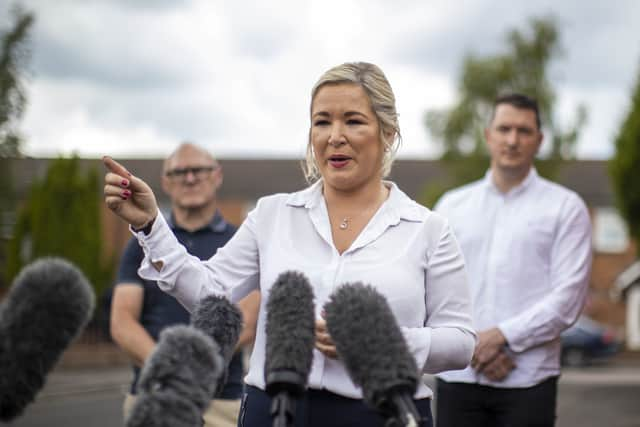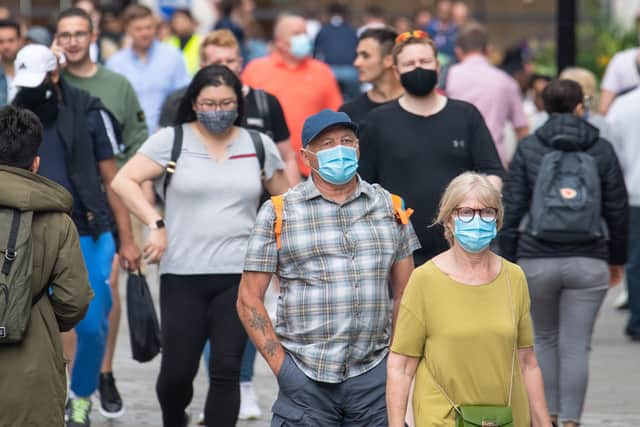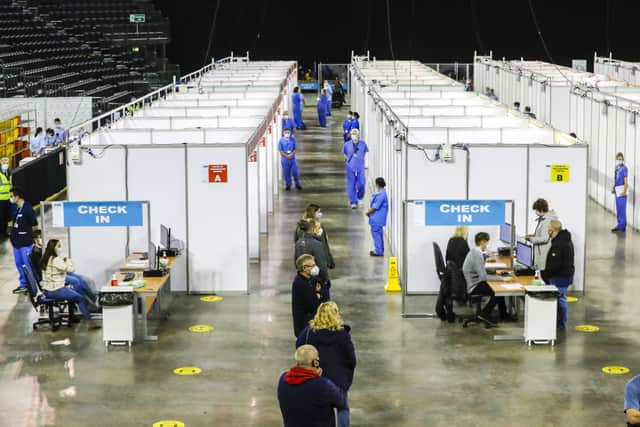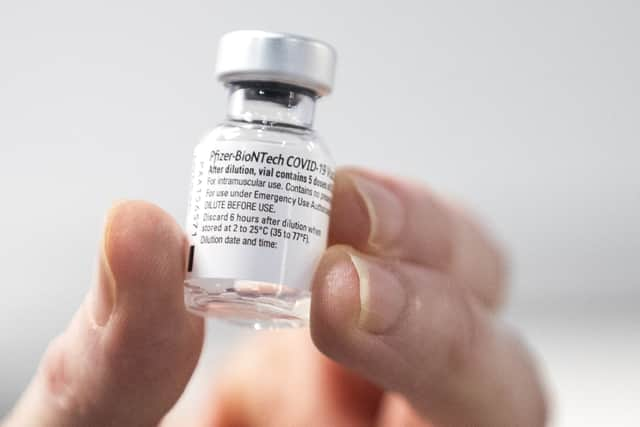Coronavirus NI - Hospitalisations up by more than 50% in last seven days with R-number between 1.2 and 1.6
and live on Freeview channel 276
For more details on this story please scroll down.
LIVE UPDATES: Coronavirus NI - Hospitalisations up by more than 50% in last seven days with R-number between 1.2 and 1.6
O’Neill brands Johnson’s plan to ease Covid restrictions in England ‘reckless’


Deputy First Minister Michelle O’Neill has described Boris Johnson’s plan to ease Covid-19 restrictions in England as “reckless” - writes Jonathan McCambridge, PA.
Ms O’Neill said there are no plans to end the use of face masks in Northern Ireland and she is “not prepared to go to the end of the line” with easing restrictions.
She said the Executive will be having discussions ahead of Thursday’s meeting to consider what further measures can be relaxed.
The Prime Minister said this week that he is confident the majority of the remaining Covid restrictions in England can be lifted from July 19.
This will include making face masks voluntary and ending social distancing.
Speaking to reporters on Tuesday, Ms O’Neill was asked if a similar approach would be considered for Northern Ireland.
She said: “In the first instance, we will not be following the Boris Johnson model; we are a locally elected Executive, we must take our own decisions in the people’s best interests here.
“We will have some discussions over today and tomorrow in advance of Thursday’s Executive, we will set out a programme of how we can remove some restrictions.
“We are still in a space where we need to be very careful. The Health Minister has made it very clear we are not in a position where we are able to remove face masks; I would support that.”
She added: “It is a case of trying to make steady progress, coming out of the restrictions as best we can, but I am not prepared to go to the end of the line yet because that is not where we are.
“I would be concerned, particularly for the people in England because of the route map that has been set out by Boris Johnson. In my opinion, I think it is a reckless approach.
“We will probably be able to set out a direction of travel for what the next couple of months will look like, but certainly it will not be everything.”
DUP leader Sir Jeffrey Donaldson said he would encourage people to continue wearing face masks until the regulations in Northern Ireland are changed.
He said: “I think we are all looking forward to the day when we can return to some degree of normality and live our lives in the way that we had become accustomed to.
“Obviously in Northern Ireland the Executive will meet, there is a paper to be brought forward by our minister for health which will make further recommendations about easing the restrictions, we will need to look at where we are with the spread of the virus in Northern Ireland.
“I think there will be many people who will still want to wear their face masks when they are out shopping, out doing business.
“I think it is right we move eventually to a situation where it is a voluntary decision by each individual and I would certainly encourage people to continue wearing their face masks and abiding by the social distancing until the new guidance.”
Chief Medical Officer Michael McBride said this week that Northern Ireland has entered a fourth wave of the coronavirus pandemic.
Sir Michael said: “We are in the fourth wave of this virus, there is no doubt about that. Numbers will increase rapidly and we can do things to slow that, we can continue to follow the public health advice, but most importantly now is the time to get the vaccine.”
Meanwhile, a further 417 positive cases of Covid-19 have been reported in Northern Ireland, the Department of Health said.
No deaths have been reported in the past 24 hours.
On Tuesday morning, there were 37 Covid-positive patients in hospital, of whom five were in intensive care.
To date, 2,079,758 vaccinations have been administered in Northern Ireland.
Hospitalisations up by more than 50% in last seven days with R-number between 1.2 and 1.6


Hospitalisations of individuals with Covid-19 in Northern Ireland have increased by more than 50 per cent in the last seven days, according to the latest data published by the Department of Health (DoC).
In the last seven days there have been 35 hospital admissions - this is more than 50 per cent more than there were recorded over the previous seven days.
There has also been a 30 per cent increase in the number of inpatients over the last seven days.
There are three more patients requiring intensive care treatment (five in total) than there were this time last week.
The DoH also reported an additional 417 new infections in the last 24 hours.
It means 2,883 individuals have tested positive for Covid-19 in the last seven days.
There were no new Covid-19 related deaths recorded.
When are changes to Covid rules expected across the UK’s four nations?


England looks set to enjoy “freedom day” on July 19 with the scrapping of coronavirus restrictions.
Here, the PA news agency takes a look at when changes are expected across the UK’s four nations.
– What is the near future looking like in England?
The Government will make a final decision on July 12 about lifting all restrictions from July 19.
If that goes ahead, the approach will be people making “their own informed decisions” rather than being governed by legal restrictions, Boris Johnson said.
All legal limits on the numbers meeting indoors and outdoors will be scrapped and all businesses will reopen, including nightclubs.
People can attend concerts, theatre and sports events and the one-metre-plus rule on social distancing will end.
A legal obligation to wear a face covering will also be removed, but Mr Johnson said guidance will suggest where people might choose to continue wearing a mask such as on crowded public transport.
The instruction to work from home will be scrapped and the limit on named visitors to care homes will be lifted.
Covid certificates will not be required as a condition of entry to any venue or event.
Changes are also expected to rules around isolation for fully vaccinated people who are contacts of those who test positive for the virus, and there will be more details on changes to bubbles and contact isolation for school pupils.
Changes to isolation rules for double-jabbed arrivals returning to the UK from amber list countries are also expected.
– What about in Wales?
Welsh health minister Baroness Eluned Morgan said the Welsh Government’s position will be announced on July 14.
But ministers have insisted they will not be rushed into a decision about scrapping restrictions.
Baroness Morgan said the Welsh Government will be “following the data rather than following the politics” when it considers whether rules can be eased over the next few weeks.
First Minister Mark Drakeford reminded people that changes announced by Mr Johnson “will apply to England only”.
He tweeted: “I’ll set out any changes for Wales next week based on the latest scientific data.
“Until then, we’ll continue our amazing vaccination programme that’s already fully vaccinated 2/3 of adults in Wales.”
– What is the situation in Scotland?
The aim in Scotland is to lift most restrictions by August 9.
It is also hoped the whole of Scotland can be placed into its lowest level of restrictions – Level 0 – on July 19.
First Minister Nicola Sturgeon has previously said that if vaccination milestones and other criteria are met, the majority of restrictions could be lifted by August 9.
– And Northern Ireland?
The Stormont Executive is set to review progress on the Pathway out of Restrictions plan at its meeting on Thursday, and consider the sequencing of further relaxations.
Live music was given the green light to return from July 5 – in a move welcomed by the hospitality sector – and the number of households permitted to meet outdoors at private dwellings increased from three to five, with the maximum number of people remaining at 15.
On Monday chief medical officer Sir Michael McBride said the country had entered a fourth wave and warned cases will increase rapidly as he urged people to keep following public health advice and take up the offer of a vaccine.
He said the wearing of face coverings has reduced transmission of the virus, and will continue to do so, but added that as more people are protected by the vaccine it will be for ministers to look at different interventions and “the necessity for them”.
Pfizer vaccine not as effective against Delta variant than originally thought, study finds


The Pfizer Covid-19 vaccine is less effective against the Delta variant as originally thought, according to a recent medical study.
The preliminary study, carried out by the Israeli health ministry over the last month, found the Pfizer vaccine was 63 per cent effective against the spread of the virus however, the same vaccine was recorded as being 93 per cent effective against serious illness and hospitalisation.
“Delta is a lot more infectious, but appears to not lead to as much serious illness and death, especially given that we now have the vaccine,” said Professor Nadav Davidovitch, who sits on the government’s expert advisory committee on Covid-19.
Public Health England found the vaccine provided 88 per cent protection against symptomatic infection with Delta, and 93 per cent against the Alpha variant first identified in Kent.
The same study found that the effect of the AstraZeneca vaccine was lower at 66 per cent for the Delta variant.
Comment Guidelines
National World encourages reader discussion on our stories. User feedback, insights and back-and-forth exchanges add a rich layer of context to reporting. Please review our Community Guidelines before commenting.
